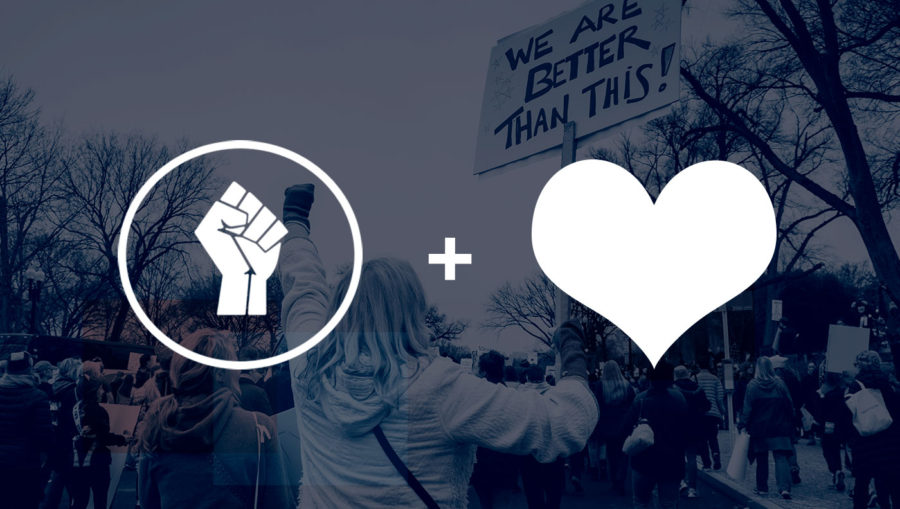For many, our current political climate is nothing new. Maybe you’ve been woke for a LONG time and you’re dealing with all the recently woke people. You’re finding yourself a tad… frustrated? Angry? Exhausted?
Maybe this is your first time participating in a rally, march, or local town hall meeting. You’re contacting your representatives and senators daily. You’re actively engaged in the conversation. You’re listening. But you’re starting to feel a little…tired. Hopeless? Drained?
Movements, as well as individuals within a movement, want to avoid burning-out. Burn-out can range from a general feeling of hopelessness to completely dropping out. Because burn-out doesn’t happen over night we can easily miss the warning signs.
You find yourself wondering, “am I really making any difference?”
First, yes you are! Activists know that in order to create a successful long term movement thoughtful, comprehensive, and inclusive activism is essential. Political and social movements have the ability to bring us together. Each and everyone of us has a part to play.
Second, take a deep breath. In order to maintain engaged and energized participants in a movement we need to talk about wellness. The good news is that activism and self-care are not mutually exclusive. Even the most engaged, kick-butt activists out there have to make sure they are physically, mentally, and emotionally ready to handle the fight.
There are plenty of check lists online to give you ideas for how to practice self-care. Activities such as taking a bath, reading a book, working out, or drinking water (pro-tip: this is essential. Please take a second to hydrate). While lists of potential activities are great it is equally as important to understand the true purpose of self-care in activism. If you are feeling the weight of, well, just about everything, listen up!
“What does self-care really mean?”
Mental health professionals speak of self-care in terms of one’s ability to perform daily activities (showering, eating, etc). Self-care in activism is a little different. It’s about your ability to continue to engage in the fight without sacrificing your mental, emotional, and physical needs.
Self-care in activism not only about making sure people sleep, it’s about allowing your community members the time and space to check in with themselves. Successful movements need sustainable activism right? This is the true significance of self-care in activism. Making sure you, and those around you, have the ability to keep going.
“Okay, so I just read a book or binge Netflix every once in a while?”
Maybe. Those can be part of your self-care routines. I mean, who doesn’t love a good Netflix binge? But wellness looks different for everyone and sometimes those activities just aren’t cutting it. Here are 6 self-care tips to help you tune-in so you can stand up.
1. Make Your Own Check-List of Things You Genuinely Enjoy Without Regret
Certain guilty pleasure television shows may be fun to watch, but sometimes it’s hard to ignore those less than great portrayals of certain groups. Kim Tran, an activist and contributing writer for Everyday Feminism, often hears her students say things like “I can’t handle racist friends anymore” and “I can’t watch a movie anymore without seeing stereotypes.” Her personal favorite is, “Sometimes everything I know about oppression feels like too much.”
This is why making a check-list of things you can genuinely enjoy without regret is important. Maybe you love a good bath. Perhaps running is your thing (go you!). Other things on your check-list could include baking cookies, eating cookies, buying ice cream, eating ice cream (this may be from my own check-list…)
The point is, make sure those activities or things you do won’t push you down a rabbit hole into self-regret. There are certain things you are allowed to like. Self-care is supposed to be a good thing. So if you don’t find joy in watching cable news– then don’t add it to the list!
2. Validate Your Feelings – You Are Allowed to Feel _____(Insert Emotion)
In any activist role you take on you can find yourself in a swirl of emotions. Excited, hopeful, compassion can also be mixed with anger, frustration, and sadness. An important piece of wellness is to understand that your emotions are valid and real. Some people may be more optimistic than you but it doesn’t give them the right to ask questions like, “why are you so angry?” or “can’t you find anything good?” (See check-list above ^^).
Know that whatever you are feeling is important. Taking the time to allow yourself to be with your emotions can give you the drive you need to keep going or to emerge recharged.
3. Step Away From the Conversation – Trolls Will Never Stop Trolling
I’ve talked about a social media cleanse and I can’t stress how important it is to take a step away. Put your phone down!
Allow yourself to stop engaging in a conversation that is going no where. While having an open dialog is important, listening is important, allowing those who are actually affected by an event the chance to speak is important – responding to every one of your old high school classmates “not all men” or “all lives matter” comments is NOT worth it.
Another trend I have noticed in social media activism is our understanding that if you aren’t posting about it you aren’t engaged enough. While people have every right to be angry (you see how all these steps are connected? ^^) you may not be comfortable engaging on social media. Just because you do not post every time you donate to a cause or every town meeting you attend doesn’t make you less of an activist. Remember activism does not have a universal code. We have to remember to allow everyone the space to practice activism in whatever way they can.
So next time you see a friend-of-a-friend’s-aunt’s-sister’s-cousin comment on a post that makes your blood boil you have permission not to engage. Sometimes trolls are just looking for attention — don’t give it to them! Feeding trolls is not worth your time. Put your energy into conversations, actions, and roles that will actually make a difference.
4. Check In With Your Health
This is where drinking water, sleeping, eating, and exercising come into play. Being in tune with your own body can help you become aware when you need to rest. Or when you need to refuel. Or when you need to eat!
5. Find a Way to Connect Your Activism to Something You Enjoy & Are Passionate About
Connecting your activism to things you enjoy is a great way to avoid burn-out. Art and activism go hand in hand. Whether you’re a writer, poet, singer, dancer, painter, rapper: use your art to call out injustice. This is a great way to practice wellness and activism at the same time! Great examples of art and activism are a Tribe Called Quest, Anderson .Paak, and Busta Rhymes’s Grammy performance, activist street art , and literature. Art takes many forms, whatever your medium is you can use it with purpose.
6. Say it With Me, “No.”
If you are an engaged citizen sometimes it can be overwhelming. You want to help everyone you can. You want to fight oppression at every level. You may constantly feel like you aren’t doing enough.
But activism comes in big and small acts. Saying “No” doesn’t mean you are a bad activist. It just means you realize you can’t do it all. Our society places and emphasis on being busy and our activism can start to take the same level of stress.
Kim Tran explains, “We live in a capitalist society that places a premium on being busy. We live in a world that tells us that if we aren’t working on something – anything! – be it homework, launching an iPhone app, or even social justice all the time that we are, in fact, wasting time. But we need to ask ourselves whether we want our movements to resemble the very same models we’re actively fighting against.”
“If I don’t go to every march, if I don’t attend every rally, if I don’t donate, if I don’t engage in every conversation on social media, if I don’t post all the time, if I don’t read every article…” You get the point.
Taking care of yourself means knowing when you are taking on too much. Yes, you want to fight like hell because the work is never ending. But that is what having a community is for. It allows us all to work together, to be allies and to be partners, to stand together. To allow others to lean on you when they just need to take a second.
So you can say, “No.” It can be just as important as saying, “Yes.”
***
Self-care is not synonymous for self-indulgence. Make sure you really take the time to actively assess what would help your mental, emotional, physical, and spiritual state in the long term rather than a short term fix. You don’t want to move towards the other side of the spectrum (the other side being five days of straight binge watching!). The point of self-care in activism is to better prepare you to get back into things and to make sure your place in the movement is sustainable.
Promoting wellness in activism is essential to creating a positive and sustainable community. So if you notice that you’re feeling mostly negative or someone you know in your community is sounding a little stressed, that self-care is about growing and learning, just like activism.




